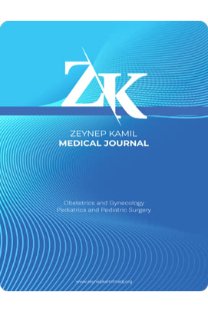ZKTB Gebelik Öncesi Beden Kitle İndeksinin Perinatal ve Neonatal Sonuçlara Etkisi The Effect of Pregestational Body Mass Index on Prenatal And Neoanatal Outcomes
The Effect of Pregestational Body Mass Index on Prenatal And Neoanatal Outcomes
___
- 1. Obesity and Overweight [Internet]. WHO Situtations Reports, 2013. [cited 2013 Apr 8]. Available from http:// www.who.int/mediacentre/factsheets/fs311/en/ 2. Uzun A. Maternal Obezitenin Prenatal ve Postnatal Gelişim Üzerine Etkileri. T.C. Süleyman Demirel Üniver- sitesi Anatomi Anabilim Dalı, Yüksek Lisans Tezi, 2011, Isparta 3. Robinson S, Shaikh H, Teoh G T, Tsoi E. Obesity in pregnancy: A major healthcare issue. Postgrad Med J, 2010; 86: 617-623. 4. Liu X, Du J, Wang G, Wang W, Xi Q. Effect of pre-preg- nancy body mass index on adverse pregnancy outcome in north of China. Arch Gynecol Obstet, 2011;283(1):65- 70. 5. Yanıkkerem E, Mutlu S. Maternal obezitenin sonuçları ve önleme stratejileri. TAF Prev Med Bull, 2012; 11(3): 353-364. 6. Farah N, Maher N, Barry S, Kennelly M, Stuart B, Turner J M. Maternal morbid obesity and obstetric out- comes. Obes Facts, 2009; 2: 352-354. 7. Baeten M J, Bukusi A E, Lambe M. Pregnancy comp- lications and outcomes among overweight and obese nulliparous women. American Journal of Public Health, 2001; 91: 436440. 8. Catalano P, Ehrenberg H. The short- and long-term implications of maternal obesity on the mother and her offspring. BJOG, 2006; 113(10): 1126-1133. 9. Guelinckx I, Devlieger R, Beckers K, Vansant G. Ma- ternal obesity: Pregnancy complications, gestational we- igth gain and nutrition. Obesity Reviews, 2008; 9: 140- 150. 10. American College of Obstetricians and Gyneco- logists. ACOG Committee opinion. Obesity in Pregnan- cy. Obstetrics & Gynecology, 2013; 106(3): 671-675. 11. Abenhaim HA, Kinch AR, Morin L, Benjamin A, Us- her R. Effect of prepregnancy body mass index catego- ries on obstetrical and neonatal outcomes. Arch Gynecol Obstet, 2007; 275: 39-43. 12. Arendes K, Qiu Q, Gruslin A. Obesity in pregnancy: Pre-conceptional to postpartum consequences. J Obstet Gynaecol Can, 2008; 30(6): 477-488. 13. Blomberg M I, Källén B. Maternal obesity and mor- bid obesity: The risk for birth defects in the offspring. Birth Defects Res A Clin Mol Teratol, 2010; 88(1): 35-40. 14. Ejder Apay S, Pasinlioğlu T. Obezite ve gebelik. TAF Prev Med Bull, 2009; 8(4): 345-350. 15. WHO. Obesity and Overweight Fact Sheet No:311, Geneva, WHO, 2004. [cited 2013 Apr 8]. Available from: http://who.int/mediacentre/factsheets/fs3117en/ print.html 16. Irvine L M , Shaw R W. The impact of obesity on obs- tetric outcomes. Current Obstetrics and Gynaecology, 2003; 13(3):179-184. 17. Paiva V L, Nomura Y M R, Dias G C M, Zugaib M. Maternal obesity in high-risk pregnancies and post- partum infectious complications. Rev Assoc Med Bras, 2012; 58(4): 453-458. 18. Sebire N J, Jolly M, Harris J P, Wadsworth J, Joffe M, Beard R W ve ark. Maternal obesity and pregnancy outcome: A Study of 287 213 pregnancies in London. In- ternational Journal of Obesity, 2001; 25: 1175-1182. 19. Nohr E A, Olsen J, Ramlau-Hansen C H, Rasmus- sen S, Vaeth M. Waiting time to pregnancy according to maternal birthweight and prepregnancy BMI. Human Reproduction, 2009;24: 226-232. 20. Chang M, Chiang K, Kuo C. The effects of pre-preg- nancy body mass index and gestational weigth gain on neonatal birth weigth in Taiwan. International Journal of Nursing and Midwifery. 2010; 2(2): 28-34. 21. Dündar Ö, Atay M, Çiftpınar T, Ergür A.R, Müngen E. Gebelik öncesi maternal vücut kitle indeksinin perina- tal sonuçlara etkisi. Perinatoloji Dergisi, 2008; 16(2): 43-48. 22. Aydın Ç, Baloglu A, Yavuzcan A, Inci A. The effect of body mass index value during labor on pregnancy outco- mes in Turkish population. Arch Gynecol Obstet, 2010; 281: 49-54. 23. Akgün N. Maternal Beden Kütle İndeksi ve Gebe- likte Vücut Ağırlığı Artışı Takibinin Perinatal Sonuçlar ile İlişkisi. T.C. Hacettepe Üniversitesi Sağlık Bilimleri Enstitüsü Beslenme Bilimleri Prog., Yüksek Lisans Tezi, 2013, Ankara. 24. Türkiye Nüfus ve Sağlık Araştırması (TNSA 2013). T.C. Hacettepe Üniversitesi Nüfus Etütleri Enstitüsü, 2013, Ankara. [cited 2013 Apr 8]. Available from http:// www.hips.hacettepe.edu.tr/TNSA_2013_ana_rapor.pdf 25. Chen M, Dammann O, Davis M J, Goodman E, Ma- dan J, Mcniff C. Maternal obesity and neonatal APGAR scores. The Journal of Maternal-Fetal and Neonatal Me- dicine, 2010; 23(1): 8995. 26. Ayan R. Gebeliğin Olağan Şikayetleriyle Başa Çık- ma Yolları ve Etkileyen Faktörler. T.C. Haliç Üniversi- tesi Sağlık Bilimleri Enstitüsü Hemşirelik, Yüksek Lisans Tezi, 2013,İstanbul. 27. Ağralı G. Maternal Obezitenin Perinatal ve Neonatal Sonuçlar Üzerine Etkisi. T.C. Sağlık Bakanlığı Bakırköy Doğumevi Kadın ve Çocuk Hastalıkları Eğitim Hastane- si, Tıpta Uzmanlık Tezi, 2005, İstanbul. 28. Işık T. M. Gebelik Sürecinde Tıbbi Aydınlatma. T.C. Çukurova Üniversitesi Sağlık Bilimleri Enstitüsü Tıp Ta- rihi ve Etik Anabilim Dalı, Doktora Tezi, 2010,Adana. 29. Khalil SH, Saleh M A, Subhani N S. Maternal obesity and neonatal congenital cardiovascular defects. Interna- tional Journal of Gynecology and Obstetrics, 2008; 102: 232236. 30. Gümüş İ, Karakurt F, Kargılı A, Turhan Öztürk N, Uyar Erkmen M. Association between prepregnancy body mass index, gestational weight gain, and perinatal outcomes. Turk J Med Sci, 2010; 40(3): 365-370. 31. Seçkin B, Özakşit G, Bitiker G, Yüksel K, Ayarcan E. Maternal Body Mass Index and the course of the labor. Gynecol Obstet Reprod Med, 2011; 17: 12-15.
- ISSN: 1300-7971
- Başlangıç: 1969
- Yayıncı: Ali Cangül
Histerektomi olgularında adenomyosis prevelansı ve ilişkili faktörler
Mehmet ŞENTÜRK, Mehmet BUDAK, Yusuf ÇAKMAK, Ömer DURUKAN, Mesut POLAT
ZKTB Yetişkin Bir Hastada İdiyopatik Vulvar Kalsinozis; Olgu Sunumu
MUSTAFA GAZİ UÇAR, CEYHAN UĞURLUOĞLU, Fatih ŞANLIKAN
Uterin karsinosarkomlarda immunohistokimyasal olarak C-KIT ekspresyonunun değerlendirilmesi
KTB Uterin Karsinosarkomlarda İmmunohistokimyasal Olarak C-KIT Ekspresyonunun Değerlendirilmesi
KTB Yenidoğan Döneminde Nadir Görülen Di George Sendromlu Olguda Geç Hipokalsemi
Handan HAKYEMEZ TOPTAN, Ayşen AKBAŞ, TÜLİN GÖKMEN YILDIRIM, Taner YAVUZ, Fahri OVALI, Güner KARATEKİN
Sezaryen skar gebeliğinde tanı, yönetim ve prognoz; vaka sunumu
Herman İŞÇİ, Gökçenur GÖNENÇ, Nilgün GÜDÜCÜ, Alin BAŞGÜL YİĞİTER, İlkkan DÜNDER
Yenidoğan döneminde nadir görülen DiGeorge sendromlu olguda geç hipokalsemi
Handan HAKYEMEZ TOPTAN, Ayşen AKBAŞ, Tülin GÖKMEN YILDIRIM, Taner YAVUZ, Fahri OVALI, Güner KARATEKİN
Serviks poliplerinin klinikopatolojik değerlendirmesi
Mehmet Baki ŞENTÜRK, MEHMET ŞÜKRÜ BUDAK, Ömer Birol DURUKAN, Yusuf ÇAKMAK, Ayhan YILDIRIM, Mesut POLAT
